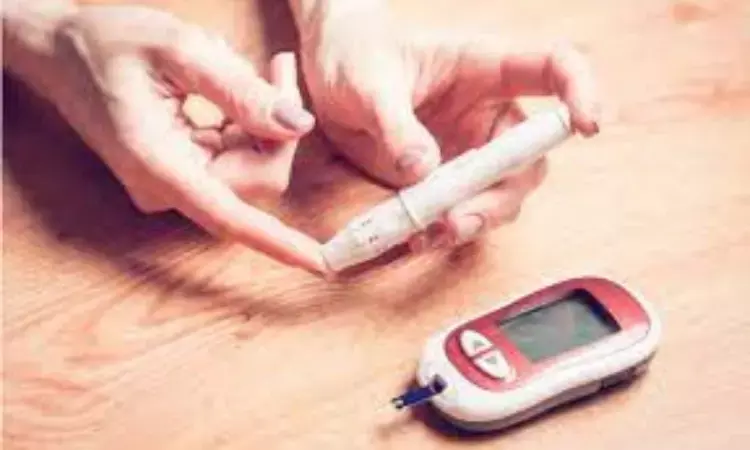- Home
- Medical news & Guidelines
- Anesthesiology
- Cardiology and CTVS
- Critical Care
- Dentistry
- Dermatology
- Diabetes and Endocrinology
- ENT
- Gastroenterology
- Medicine
- Nephrology
- Neurology
- Obstretics-Gynaecology
- Oncology
- Ophthalmology
- Orthopaedics
- Pediatrics-Neonatology
- Psychiatry
- Pulmonology
- Radiology
- Surgery
- Urology
- Laboratory Medicine
- Diet
- Nursing
- Paramedical
- Physiotherapy
- Health news
- Fact Check
- Bone Health Fact Check
- Brain Health Fact Check
- Cancer Related Fact Check
- Child Care Fact Check
- Dental and oral health fact check
- Diabetes and metabolic health fact check
- Diet and Nutrition Fact Check
- Eye and ENT Care Fact Check
- Fitness fact check
- Gut health fact check
- Heart health fact check
- Kidney health fact check
- Medical education fact check
- Men's health fact check
- Respiratory fact check
- Skin and hair care fact check
- Vaccine and Immunization fact check
- Women's health fact check
- AYUSH
- State News
- Andaman and Nicobar Islands
- Andhra Pradesh
- Arunachal Pradesh
- Assam
- Bihar
- Chandigarh
- Chattisgarh
- Dadra and Nagar Haveli
- Daman and Diu
- Delhi
- Goa
- Gujarat
- Haryana
- Himachal Pradesh
- Jammu & Kashmir
- Jharkhand
- Karnataka
- Kerala
- Ladakh
- Lakshadweep
- Madhya Pradesh
- Maharashtra
- Manipur
- Meghalaya
- Mizoram
- Nagaland
- Odisha
- Puducherry
- Punjab
- Rajasthan
- Sikkim
- Tamil Nadu
- Telangana
- Tripura
- Uttar Pradesh
- Uttrakhand
- West Bengal
- Medical Education
- Industry
Novel sensor can detect glucose in normal range as well as at extreme levels: PLOS One

Malaysia: A novel sensor using a millimeter-wave metamaterial-inspired resonator can be used to monitor glucose in a normal range as well as at extreme levels, a recent study in the journal PLOS One has revealed.
Millimeter-wave frequencies are promising for detecting blood glucose levels, where the temperature effect is insignificant. All these features provide the feasibility of continuous, portable, and accurate monitoring of glucose levels.
Considering the above, Suhail Asghar Qureshi, Universiti Tun Hussein Onn Malaysia (UTHM), Batu Pahat, Johor, Malaysia, and colleagues presented a metamaterial-inspired resonator comprising five split-rings to detect glucose levels at 24.9 GHz. The plexiglass case containing blood is modeled on the sensor's surface and the structure is simulated for the glucose levels in blood from 50 mg/dl to 120 mg/dl.
The sensor's novelty is demonstrated by its capability to sense the normal glucose levels at millimeter-wave frequencies. The dielectric characteristics of the blood are modeled by using the Debye parameters.
The key points of the study are:
- The proposed design can detect small changes in the dielectric properties of blood caused by varying glucose levels.
- The variation in the transmission coefficient for each glucose level tested in this study is determined by the quality factor and resonant frequency.
- The sensor presented can detect the change in the quality factor of transmission response up to 2.71/mg/dl.
- The sensor's performance has also been tested to detect diabetic hyperosmolar syndrome.
- The sensor showed a linear shift in resonant frequency with the change in glucose levels, and an R2 of 0.9976 was obtained by applying regression analysis.
The researchers summed up the findings by stating that, "the sensor can be used to monitor glucose in a normal range as well as at extreme levels."
"In the future, the design needs fabrication and the results will be corroborated with those obtained in simulations. This novel biosensor can be potentially used in the detection of daily glucose level purposes," they concluded.
Reference:
Qureshi SA, Abidin ZZ, Elamin NIM, A. Majid H, Ashyap AYI, Nebhen J, et al. (2022) Glucose level detection using millimetre-wave metamaterial-inspired resonator. PLoS ONE 17(6): e0269060. https://doi.org/10.1371/journal.pone.0269060
Dr Kamal Kant Kohli-MBBS, DTCD- a chest specialist with more than 30 years of practice and a flair for writing clinical articles, Dr Kamal Kant Kohli joined Medical Dialogues as a Chief Editor of Medical News. Besides writing articles, as an editor, he proofreads and verifies all the medical content published on Medical Dialogues including those coming from journals, studies,medical conferences,guidelines etc. Email: drkohli@medicaldialogues.in. Contact no. 011-43720751


